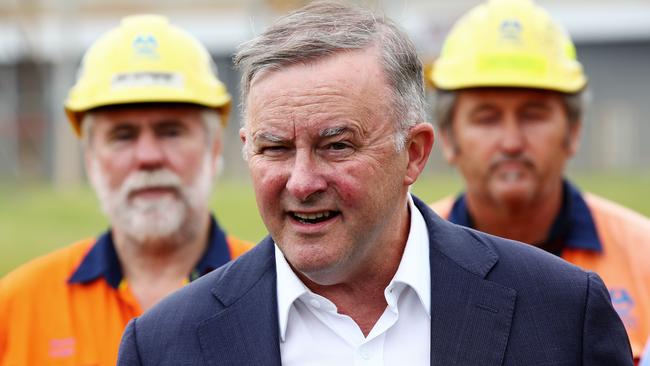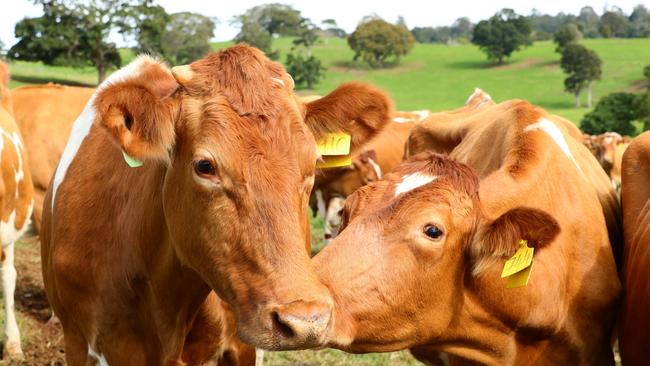Vikki Campion: High paying bush jobs to disappear under Labor
The six figure salaries enjoyed by engineers and tradies in the mines will disappear under Labor’s plans to transition to a net zero economy, writes Vikki Campion.
Opinion
Don't miss out on the headlines from Opinion. Followed categories will be added to My News.
The bulk of the known 604,000 jobs Labor claims to generate in a net zero economy by 2030 will be in minimum wage positions such as contract tree planters, composting and applying chemicals to cowpats.
In place of the six-figure salaries the energy sector currently offers engineers and tradies, will be “carbon farming”, which Labor’s modelling acknowledges is planting trees.
While it mentions three times that “5 of 6 jobs will be in the regions”, it doesn’t mention that tree planters get $26.32 an hour – just $6.01 more than the minimum wage Labor claims to want to raise.
Apparently, being paid $20.31 an hour in retail is no good, but $26.32 for backbreaking work is just fine if it means fewer emissions.
Labor is very good at talking about transitioning out of industries, including live export and coal mining, but avoids going into detail on precisely what regional Australia is transitioning to.

If they genuinely care about the cost of living, then why rip well paid jobs out of regional Australia and replace them with minimum wage? How grateful will workers in Flynn, Capricornia, Hunter or Lingiari be to find a shovel is replacing their truck as their salary plummets from $120,000 a year to $52,000.
“Jobs attributed to reforestation plantings are expected to be the largest source of new job creation, reflecting the largest investment in that activity, followed by rangeland regeneration, soil carbon, and savanna burning,” The Economic Impact of the ALP’s Powering Australia Plan says.
Is Labor seriously implying that the Aussie bush requires human gardening skills to grow?
Savanna fire management methods “are expected to create the largest number of jobs per dollar invested, with 12 jobs per million dollars (jobs/$m), followed by reforestation plantings and soil carbon (10 jobs/$m), and forest regeneration and rangeland protection (9 jobs/$m)”.
Modelling details claim “waste reduction: including composting, innovative packaging solutions and plastic recycling” would create 3390 jobs.
The remaining job references in the plan are vague, such as “energy efficiency improvements modelled to create 533 jobs in 2030”.
Anthony Albanese promises “a better future” in his advertising but his policy breaks that promise for well-paid resource and agriculture employees and businesses in the pursuit of ideology more green or teal than red.

If only there were the opportunity in the whole six-week campaign to hear the details of Mr Albanese’s low-paid, temporary employment policy for former miners.
Carbon farming, the plan says, will give us permanent jobs “such as Indigenous rangers, carbon foresters, land managers, stockmen and tree planting contractors”.
Permanent? Where do these jobs go in a drought when farm workers typically have to return to work in town to bring income to the place?
It claims 70 jobs will come from agricultural methane reduction, including “anti-methanogenic treatments, composting of mature, natural grassland management, (SIC) and the application of nitrification inhibitors to animal waste”.
The Economic Impact of the ALP’s Powering Australia Plan doesn’t mention the word “mine”, and the few mentions of coal claim countries are abandoning it, despite our wholesale coal price doubling in the past year as other countries clamour for it.
There is no breakdown of the 604,000 jobs by 2030 that Labor is promising, making it an incredibly risky document to pin an election on. Only 10 per cent of those promised jobs by 2030 are even vaguely detailed – the rest are “indirect and supported” meaning they are likely to be in industries that haven’t been established yet, like green hydrogen.

And those barely cover the jobs to be lost – like the 52,600 in coal.
If you can calculate how many jobs there will be, you should be able to tell us what they are, what we will be doing, what they will pay and what we will be reskilling for.
If you are telling workers to swap trade tickets for university degrees in battery manufacture, that’s not a transition; that’s a redundancy.
Tradies with kids and mortgages might want to study further but find it financially unfeasible where just a high-school equivalency can be $10,000. It’s one thing to throw a curve ball into a stable economy with a radical wage policy which will have the net effect of job losses in a bid to identify with families struggling with the cost of living but another entirely to replace their well-paid jobs with pay cuts and refuse to acknowledge it at all.
Former Labor leader Bill Shorten at least told us what he would do if he got to the Lodge – this time they have learnt from the low target Biden campaign buoyed by waves of social divisiveness and aided by the Teals running in Liberal inner-city seats, who have saved Labor about $200 million while inoculating them from environmental job-loss attack.
On every main street at the moment, there is “staff wanted’ signs, a sure indicator that in an unstable global environment, the one thing going right is Australia’s economy.
But instead, it looks like we are going to bank on some 400,000 hypothetical jobs – we don’t know what they are or what qualifications we’ll need – but we can always go and plant trees for $26 an hour.
Vikki Campion is the partner of Deputy Prime Minister Barnaby Joyce





